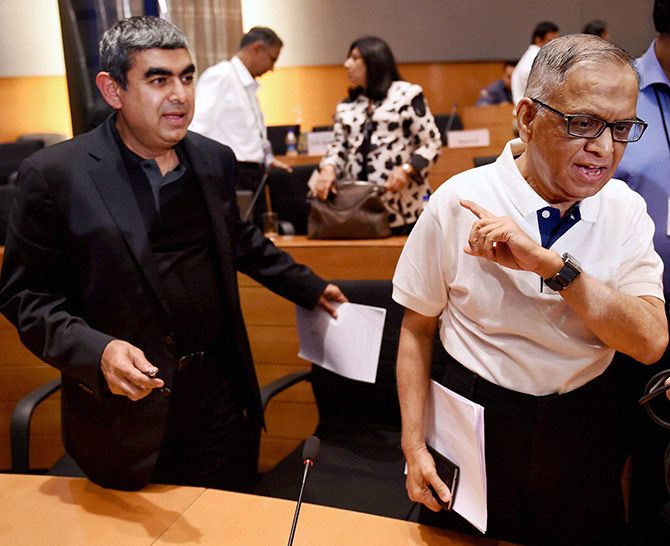Many say N R Narayana Murthy returned to Infosys only because it was floundering.
Ironically, that itself can be interpreted as the great man's biggest failure. It's inconceivable that he wasn't able to groom a single leader in his two decades at the helm.
Shyamal Majumdar on the pitfalls of 'Founder's Syndrome'.

Photograph: PTI Photo.
N R Narayana Murthy never ceases to surprise -- the latest was his comment that leaving Infosys in 2014 was the biggest regret of his life. This was a disappointing statement from a man who had, in the past, spoken endlessly about the need for India Inc to have truly independent boards and an empowered professional management.
Infosys has a board, comprising some of the leading names in Indian industry, and a managing director whom Murthy hand-picked -- yet, the co-founder chooses to make a public statement about his 'regret' of leaving early. The signal that goes out to the world outside is his lack of confidence in the board and the management.
Murthy has already made sure that the world knows about his unhappiness with the current Infosys chairman and the way the company is being run, following which the company took a series of actions to address his concerns. But just when everybody thought the issues had been resolved, Murthy dropped another bombshell, making it obvious he remains extremely unhappy.
It's not that Murthy had left Infosys in 2014 in a hurry.
It was his second coming (he had retired in 2011 as non-executive chairman) after a desperate Infosys turned to him for guidance and made him executive chairman in 2013. In the process, he joined a long list of founders such as Michael Dell, Steve Jobs and Howard Schultz in the entrepreneurial hall of fame. Like Murthy, all of them returned to the companies they had started after either retiring or being ousted from them.
But in the process, Murthy, who was known for his obsession with following the company's rules, returned to the company in an executive capacity even though he was well past the age of 65, Infosys's official retirement age.
The moot point is what exactly Murthy is trying to achieve with his public outbursts against the board and the management, apart from forcing them to be on the defensive.
Infosys co-chairman Ravi Venkatesan, who is said to be close to Murthy, has been working hard to get the promoters and the management working together as 'one Infosys' and not operating in different pockets. One wonders whether those efforts have yielded any result.
Also read: The other problems at Infosys
- Is the Infy board the real problem?
- The 'cultural differences' at Infosys
- Infosys is no longer a cut above the rest
Many say Murthy came back to Infosys in 2014 only because the company was floundering at that point. Ironically, that itself can be interpreted as the great man's biggest failure.
It's inconceivable that he wasn't able to groom a single leader in the two decades that he was at the helm. And finally, when a managing director is brought in from outside, the founders wait for two years, and then go all out to issue a series of public statements about their concerns with the way the company is being run.
The point is that making yourself indispensable is a skill that a large number of leaders seem to have perfected into a fine art. Corporate history has shown us how founders are great at starting and building, but usually terrible at letting go and allowing the organisation to grow into a second phase of life without them, with a different leader at the helm.
And it's not about Murthy.
Research has found that a majority of leaders love to think -- and force others to think -- that they are simply indispensable.
What's worse, after they leave, they have zero tolerance for any deviation from the norms set by them. In the process, they ignore the momentous changes in the external environment.
It's nobody's case that these leaders haven't done much -- they are all super brilliant, have given everything to work, and have left a huge impact on their respective organisations. One only wishes they also learnt how to let go.
It's called Founder's Syndrome, which occurs when an organisation operates primarily according to the personality of a key person such as the founder, rather than focused on its overall mission.
It's tricky if the founder is a visionary, highly charismatic and has a strong personality. And a strong founder in the background is even more problematic -- the CEO he has helped appoint will all the time try to second-guess the founder.
An organisation can't be run in the belief that the founder will be around forever. So, the questions the founders should ask are: Have they prepared the organisation to survive and thrive without their presence? Can they think of leaving?
If the answer is 'no', then the founders have somehow made the organisation about themselves, rather than about the mission.












 © 2025
© 2025